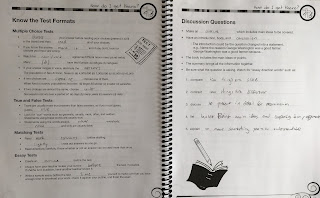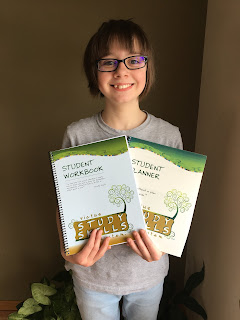I wonder who can identify with this scenario:
Your son or daughter has just done poorly on an assignment, a paper or test perhaps. You, the parent, are frustrated. They aren't working up to their potential you think, and might even tell them so. You feel that they aren't trying hard enough. In this situation, what do you say to your child? There's a good chance that the words that come out of your mouth are the same ones that many before you have uttered -"You need to study harder!". Is that really the problem though? Could it be that the heart of the issue is actually the way that we, parents, students, teachers, approach the subject of study habits?
I'll raise my hand and be the first to admit that there have been plenty of times that I have told my daughters that if they would apply themselves a little more, they would get that higher grade. The question is, apply themselves to what? We focus on the outcome, but often don't teach our children how to get there. *Lightbulb!* I didn't even fully realize this was an issue until we had the opportunity to review the
Level 3 (grades 5/6 - 10/11) workbook from
Victus Skills Study System. I'll come back around to our level shortly, but first, an overview of the entire system...
If I may speak for homeschoolers in general, we love a resource that can be used over several grade levels, and this study system does just that. Four different levels are available:
* Level 1 - Primary - Grades K - 2/3 - Includes Teacher Supplement and Student Workbook. Teacher led, this is a shortened version of the later materials, with 6 lessons.
* Level 2 - Elementary - Grades 2/3 - 4/5 - Includes Teacher Supplement and Student Workbook. Teacher led, with 10 lessons to learn the three foundational cornerstones of learning, and apply them.
* Level 3 - Grades 5/6 - 10/11 - Includes Teacher Edition and Student Workbook. Ten lessons in a more in depth level than earlier grades teach the necessary skills for effective studying. Also Teacher led.
* Level 4 - Grades 10/11 - College - Includes Student Workbook. Uses the principles of the Victus Study Skills System. Presents the syllabus and how to use it, taking notes in college, and other higher level study habits/skills.
"For the sole true end of education is simply this: to teach men how to learn for themselves; and whatever instruction fails to do this is effort spent in vain." - Dorothy Sayers
Alright, let's make our way back around to the level that we used. I found that Level 3 was the right one for my 13 year old. As an 8th grader, she fits right smack in the middle for the suggested ages/grades. There are two resources available for students on this level, the Student Workbook, and the Student Planner. My girl loves pretty much anything having to do with organization, so she was loving these resources.
How it works:
This is a short course. There are ten lessons that can be taught in as little as 5 hours, so there are a variety of ways that parents and teachers might go about teaching this material. We went through the lessons in a couple of school weeks, but you can combine 2 lessons at a time and complete it in 5 days.You should find this to be simple to present, as you have the dialogue right in the Teacher Edition to walk you through it. Preparation is not difficult, but it does require that you take the time to read through the lessons prior to teaching, to get acquainted with the material. A few sections suggest light preparation, like simple research of a topic, or preparing questions for students, but really, there is little that needs to be gathered by the parent or teacher.
Victus Study Skills Systems poses three questions:
1.) Where Are You Now?
2.) Where Do You Want To Be?
3.) How Do You Get There?
The concepts taught in this course:
1.) Zeal without knowledge is not good, but zeal with knowledge bears fruit.
2.) Results come from the process.
3.) Any system with all of its components must have aim, or purpose.
4.) A unique and effective system of study has the greatest likelihood of aiding in success.
So very simple, and yet how often has it been the case that I've sent my kids off to "study more", without teaching them how. Ugh. This course is as valuable for me as it is for my girls.
REMEMBER:
You are teaching concepts that students will apply to academics and to life.
There are a few self evaluations and quizzes that students will take to get a look at their current study habits. They will have the opportunity to compare where they were 5 years ago, currently, and where they wish to be 5 and 10 years from now. After looking over those, there will be another page to set personal goals, and the steps needed to get there. After completing her assessment, my daughter determined that she wants to raise her Math grade from a low B up to an A. She figured that she needs to go back and spend more time in review and practice to strengthen the areas of weakness. She even chose to work on her Math for a bit on weekends. I was pleased to see her determination and focus even so early on. She is pleased with the structure that this new schedule provides.
After filling in objectives for a monthly schedule plan, they will learn the PQRST process. This stands for:
P - Preview
Q - Question
R - Read
S - State
T - Test
These steps will teach students how to make the most of their study time, as they learn how to efficiently interpret what is being learned. They are then encouraged to come up with their personal shorthand, as they learn to take effective notes. There are good ideas for sorting out the main ideas from general lectures. Skills are practiced through exercises presented in the Student workbook, for example, the teacher reads an excerpt and students take notes, pulling out the most important concepts.
As the lessons move forward, students will glean tips on strategies for test taking, and how to proceed when presented with various test types, whether essay, fill in the blank, or multiple choice. These are really good, and excellent help, particularly for those who find that nerves take over when being tested.
There is plenty of review that occurs throughout the lessons, so you can make sure that the concept is retained. The Teacher Edition includes a helpful Appendix with organization tips, assessments, mnemonic helps, and flashcards. A larger Student Planner, separate from the Workbook is available for long term planning across the year, and my daughter loves it. It is set up as a weekly calendar with space to write in the dates, pages for notes, and a grade log in the back for record keeping. My daughter likes that it has "Odd But True" facts at the bottom of each page.
Thoughts from my 13 year old:
"The Victus Study Skills System is great for learning how to study harder, and more efficiently. Interesting fact sheets and quizzes make it fun to use, and easy to follow. I like that it has shorter lessons, because it helps me to retain more information in a shorter time period. There are a few challenges for me in the shorthand section. It suggests not worrying about spelling and neatness as I take notes. That's hard, because I prefer to be neat and correct. All in all, I think that this is a great system."
"A goal without a plan is just a wish."
My opinion aligns with my daughters'. This is a solid, effective, course that will serve your students well in school, as well as life in general. This is a great tool for schools, whether public or private, or homeschool, co-op's and anywhere else you can come up with. Visit their website for further details.
Find Victus Study Skills System on social media:
Facebook
Twitter
Pinterest
YouTube
Read more reviews from other Crew members, including those that used other levels, by clicking on the banner below!





































